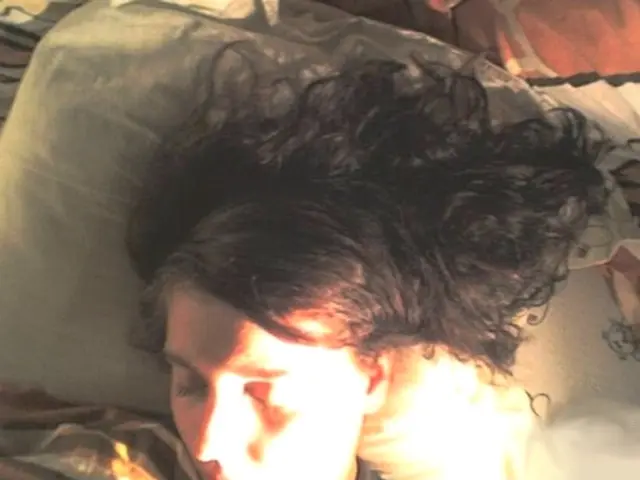Enhance Your Slumber with Mouth Taping Now
Mouth taping, a method that involves taping the mouth shut during sleep to encourage nasal breathing, has gained popularity on social media platforms like TikTok, with over 51.7 million views under the hashtag #mouthtaping. While proponents claim that it can aid mouth breathers, individuals with sleep apnea, and those experiencing snoring issues, the scientific community's view on mouth taping is more nuanced.
Nose breathing is more efficient for sleep, leading to a significant reduction in snoring. By promoting nasal breathing, mouth taping can potentially reduce snoring, making it softer and thus improving sleep quality for both the snorer and their partner. However, scientifically, the proven benefits of mouth taping mainly relate to promoting nasal breathing, which has some established advantages such as filtering and humidifying the air and potentially reducing snoring or dry mouth in certain individuals.
Nasal breathing can help maintain better oxygen absorption and carbon dioxide balance, which might contribute to improved sleep quality and overall respiratory function. However, many experts emphasize the limited and anecdotal nature of evidence supporting mouth taping, and there is little rigorous research validating its benefits for sleep quality or dental hygiene.
On the other hand, potential risks and harms linked to mouth taping are more clearly documented. The serious risk of asphyxiation for people with nasal obstruction or congestion, allergies, or sleep-disordered breathing such as obstructive sleep apnea is a significant concern. Discomfort and disrupted sleep due to mouth irritation or difficulty catching breath during the night are also potential issues. Skin irritation and possible anxiety from having the mouth taped shut are other concerns.
Not recommended for individuals who are overweight, consume alcohol, or have colds or nasal congestion, mouth taping carries safety concerns, especially for people with nasal or respiratory issues. Experts suggest that improving sleep quality is better approached through well-established methods like good sleep hygiene, dietary and exercise habits, and medical treatment for underlying conditions rather than relying on mouth taping.
For those considering mouth taping, using hypoallergenic or medical-grade tape can reduce the risk of skin irritation. Cutting the tape to cover the lips properly is also important for effective mouth taping. However, it is crucial to consult a healthcare expert before trying mouth taping, especially for those with health issues or sleep disorders.
In summary, while nasal breathing is beneficial, forcing mouth closure by taping lacks strong scientific support and carries safety concerns, especially for people with nasal or respiratory issues. Mouth taping is not widely scientifically endorsed and should be approached with caution.
| Aspect | Benefits | Potential Risks/Concerns | |----------------------|-------------------------------------------|-------------------------------------------------| | Sleep quality | May reduce snoring, dry mouth via nasal breathing | Risk of asphyxiation if nasal airway obstructed | | Dental hygiene | Potentially reduces mouth dryness | Possible irritation from tape | | Jawline/energy claims | Unsupported by solid evidence | No scientific basis | | Safety | Safe only if no nasal blockage or sleep disorders | Skin irritation, breathing difficulty, anxiety |
Other methods to improve sleep quality and reduce mouth breathing include adjusting sleep positions, using nasal strips, and keeping a sleep diary to understand one's sleep patterns. Lying on your side instead of your back can help reduce snoring and is beneficial for people with sleep apnea. Keeping the mouth closed while sleeping is important for overall health, as breathing through the mouth can cause inflammation and lead to serious health issues like cardiovascular disease and type 2 diabetes.
In conclusion, while mouth taping may offer some benefits for certain individuals, it is crucial to approach it with caution, especially for those with nasal or respiratory problems. Consulting a healthcare expert is always advisable before trying mouth taping or any other sleep-related practices.
- The act of taping the mouth shut during sleep, known as mouth taping, can potentially reduce snoring by promoting nasal breathing, which is more efficient for sleep and may lead to improved sleep quality for both the snorer and their partner.
- While nasal breathing can help maintain better oxygen absorption and carbon dioxide balance, contributing to improved sleep quality and overall respiratory function, the proven benefits of mouth taping for health-and-wellness, such as sleep quality or dental hygiene, are limited and often anecdotal, with little rigorous research validating its benefits.








